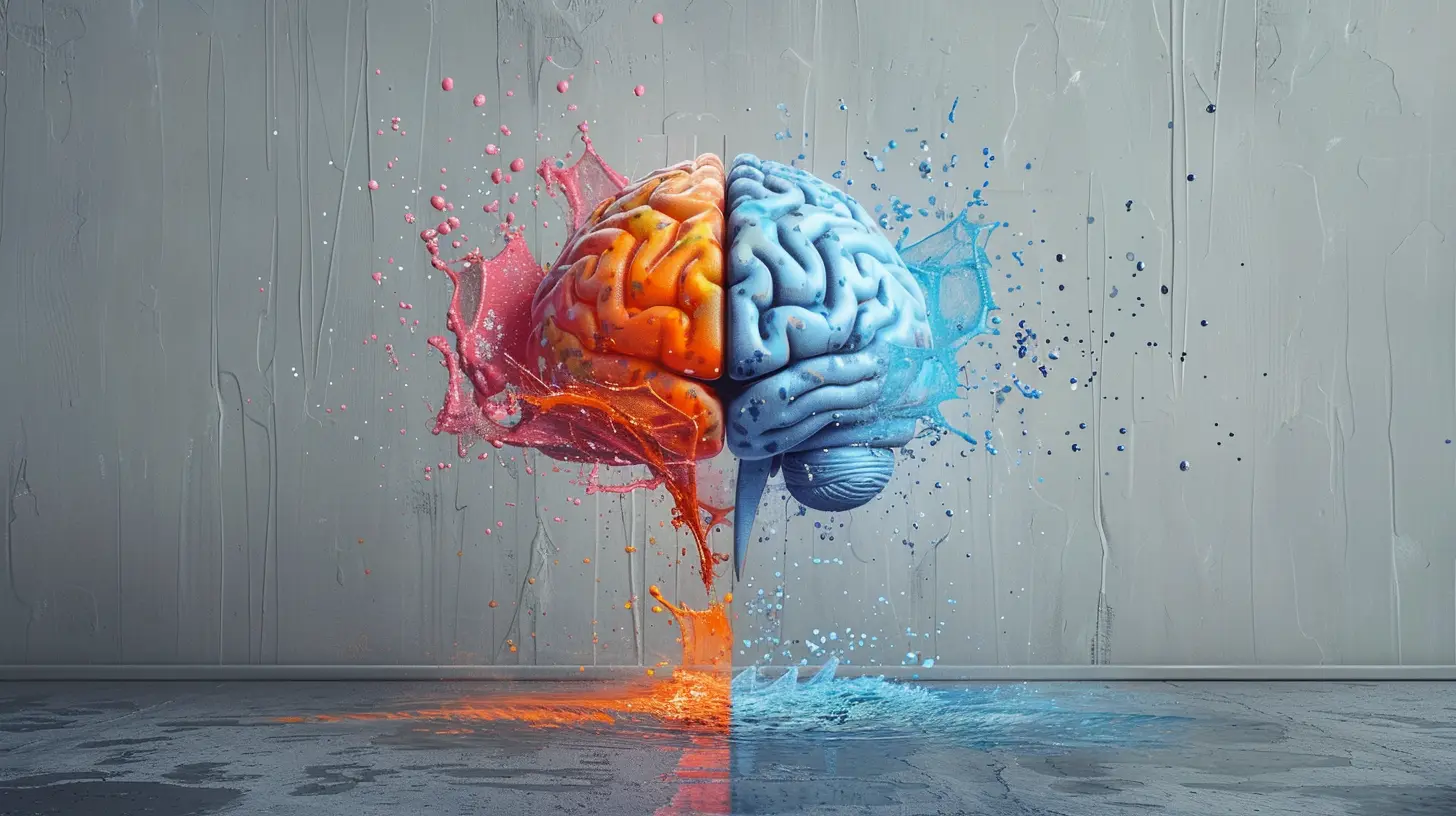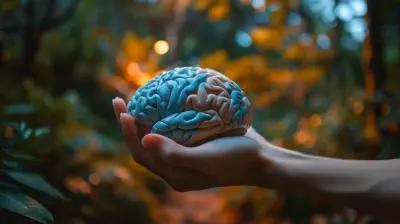Cognitive Development in Adolescence: What Changes?
3 December 2024
Adolescence is one of the most dynamic and challenging periods in a person's life. It's like being on a rollercoaster without a seatbelt—full of ups, downs, and unexpected twists. If you’ve ever wondered why teenagers seem to be constantly changing their minds, why they act impulsively, or why they can engage in deep philosophical debates one moment and make reckless decisions the next—it's all about cognitive development.
In this article, we’re going to explore what exactly changes in the brain during adolescence and how those changes affect thinking, decision-making, and emotional regulation. Buckle up; it's going to be an enlightening ride!

What is Cognitive Development?
Before we dive into the specifics of adolescence, let’s take a step back and define cognitive development. Simply put, cognitive development refers to the growth and change in mental processes—such as thinking, reasoning, memory, and problem-solving—that occurs throughout life. It’s how we go from being a baby who can’t even grasp the concept of object permanence (ever play peek-a-boo?) to an adult who can solve complex problems and think abstractly.But adolescence is a particularly critical stage for cognitive growth. It’s a time when the brain undergoes significant rewiring, which influences not just how teenagers think but also how they navigate the world around them.

The Adolescent Brain: A Work in Progress
You might think of the adolescent brain as a construction zone—there’s a lot happening behind the scenes, and not everything is fully operational yet. In fact, the brain doesn’t fully mature until the mid-20s, but adolescence is when some of the most critical changes take place.The Prefrontal Cortex: Executive Function on Hold
The prefrontal cortex, often referred to as the “CEO of the brain,” is responsible for higher-order functions like decision-making, planning, impulse control, and understanding consequences. Unfortunately for teens, this area of the brain is one of the last to fully develop.What does that mean? It means that while adolescents have the capacity for advanced reasoning and problem-solving, they often struggle with impulse control and risk assessment. Ever wonder why your teenage son or daughter thought it was a great idea to jump off the roof into the pool? You can thank their still-maturing prefrontal cortex.
The Limbic System: Emotion on Overdrive
While the prefrontal cortex is lagging behind, the limbic system—the part of the brain involved in processing emotions and rewards—is fully operational and often in overdrive. This imbalance between emotional processing and rational decision-making is one reason why teens can be so emotionally volatile.It also explains why adolescents are more likely to engage in risky behavior: They're wired to seek out experiences that bring emotional highs, like excitement or pleasure, but they lack the fully developed cognitive tools to assess the risks.
Synaptic Pruning: Use It or Lose It
Another significant change happening during adolescence is synaptic pruning. This is the brain’s way of getting rid of neural connections that aren’t being used frequently, kind of like decluttering a messy closet. By cutting out the unnecessary connections, the brain becomes more efficient.But here's the kicker: what gets pruned depends on what the teen is doing with their brain. If they’re learning new skills, studying, or engaging in critical thinking, those pathways will be strengthened. But if they’re spending hours scrolling through social media or playing video games, other, perhaps less useful, pathways may get reinforced. It's a good reminder that the activities teens engage in during this time can shape their brain development in meaningful ways.

Cognitive Milestones in Adolescence
Now that we’ve covered the basic changes happening in the adolescent brain, let’s look at some specific cognitive milestones that many teens go through. These shifts are part of what makes adolescence such a unique and transformative period of life.1. Abstract Thinking
One of the most profound changes during adolescence is the ability to think abstractly. Kids go from concrete thinking—where they can only understand things they can see or touch—to being able to consider hypothetical situations, abstract concepts, and possibilities that aren't directly tied to the here and now.For example, a younger child might think in terms of “if I touch the hot stove, it will burn me,” while a teenager can think more abstractly: “What happens if I take this risk? What are the long-term consequences?”
This newfound ability to think abstractly is why teens often begin questioning authority, social norms, and even their own beliefs. They can now engage in deeper, more philosophical conversations and are more open to considering multiple perspectives.
2. Metacognition: Thinking About Thinking
Metacognition is another cognitive milestone that emerges during adolescence. This is the ability to think about one's own thinking. It might sound a bit meta (pun intended), but it's a critical skill that allows teens to become more self-aware, strategize, and reflect on their own thought processes.For instance, a teen might start to realize that they study better at night rather than in the morning, or they might begin to recognize when they’re feeling stressed and take steps to manage it. This self-awareness is a crucial step toward becoming an independent adult.
3. Multi-Dimensional Thinking
As teens move from concrete to abstract thinking, they also become more capable of multi-dimensional thinking. This means they can consider multiple factors and viewpoints at once.In younger children, thinking tends to be black-and-white. But as teens mature, they can appreciate the nuances and complexities of different situations. They begin to understand that there isn't always a right or wrong answer and that life is often full of gray areas.
This cognitive shift is why adolescents can seem contradictory at times. They are grappling with the ability to hold multiple ideas in their heads at once, which can lead to confusion and indecision—but it’s also a sign of growing mental complexity.
4. Improved Problem-Solving Skills
Problem-solving is another area where adolescents show marked improvement. Thanks to the development of their prefrontal cortex (even though it's not fully there yet), teens become better at solving complex, multi-step problems. They can plan ahead and think about the potential consequences of their actions more effectively than younger children.This doesn’t mean they’ll always make the best decisions (remember, impulse control is still lagging), but they are certainly more equipped to tackle challenges with a more strategic mindset.

The Role of Social Interaction in Cognitive Development
While the brain is doing a lot of internal work during adolescence, external factors also play a crucial role in cognitive development—especially social interaction.Peer Influence: The Double-Edged Sword
Peers become incredibly important during adolescence, and they can have a significant impact—both positive and negative—on cognitive development. Adolescents are more likely to take risks when they are with their friends, partly because of peer pressure and partly because the emotional highs are amplified in social settings. However, positive peer influence can also encourage teens to develop new skills, take on leadership roles, or engage in healthy behaviors.Parental Guidance: Still Important
Even though teens are striving for independence, parental influence remains strong. The way parents talk to and interact with their adolescents can shape their cognitive development. Open communication, encouragement of critical thinking, and providing a safe space for emotional expression are all ways parents can positively influence their teen's mental growth.How Cognitive Development Impacts Behavior
Understanding the cognitive changes happening during adolescence can provide insight into some of the behaviors that often baffle parents, teachers, and even the teens themselves.Risk-Taking
As we’ve discussed, the combination of an underdeveloped prefrontal cortex and an overactive limbic system makes teens more likely to engage in risky behavior. They’re wired to seek out new experiences, and sometimes those experiences come with poor judgment.Emotional Volatility
Teens can swing from one extreme emotion to the next in a matter of minutes. This emotional volatility is partly due to the fact that their brains are still learning how to regulate emotions effectively. The limbic system is in overdrive, and the prefrontal cortex hasn’t yet caught up to help manage those intense feelings.Identity Exploration
With the ability to think abstractly and question societal norms, adolescence is also a time of significant identity exploration. Teens are trying to figure out who they are, what they believe, and where they fit in the world. This can lead to shifts in behavior, as they experiment with different identities, friend groups, and values.
Conclusion
Cognitive development in adolescence is a wild and fascinating process. From abstract thinking and metacognition to the ongoing battle between impulse control and emotional highs, the changes happening in the adolescent brain are profound. Understanding these shifts can help us be more empathetic toward teens and guide them more effectively through this tumultuous time.So the next time your teenager is driving you up the wall with their impulsive decisions or emotional outbursts, just remember—it’s all part of the brain’s complex journey toward adulthood. And while it may seem chaotic now, these changes are laying the foundation for a lifetime of critical thinking, problem-solving, and emotional regulation.
all images in this post were generated using AI tools
Category:
Cognitive DevelopmentAuthor:

Eliana Burton
Discussion
rate this article
13 comments
Tatianna McFarlane
This article excellently highlights the significant cognitive changes in adolescence, emphasizing how increased reasoning skills and emotional regulation shape decision-making and relationships during this critical period.
February 1, 2025 at 3:28 PM

Eliana Burton
Thank you for your thoughtful comment! I’m glad you found the article helpful in understanding the important cognitive changes during adolescence.
Zoey McGrady
This article beautifully highlights the fascinating shifts during adolescence! It's incredible how our brains evolve and shape our thoughts, emotions, and relationships. Understanding these changes can help us navigate this sometimes turbulent phase with more empathy, both for ourselves and the teens in our lives.
January 25, 2025 at 3:24 PM

Eliana Burton
Thank you for your thoughtful comment! I'm glad you found the article insightful. Understanding these shifts is indeed crucial for fostering empathy during such a transformative time.
Echo Carr
Mind blooms like spring; thoughts dance, dreams take flight.
January 21, 2025 at 3:28 PM

Eliana Burton
Thank you! Adolescence is indeed a transformative time when cognitive abilities expand, leading to new ideas and aspirations.
Nina Cooper
This article beautifully captures the complexities of cognitive development in adolescence. Understanding these changes can foster empathy and support for the unique challenges teens face. Thank you!
January 17, 2025 at 4:19 PM

Eliana Burton
Thank you for your kind words! I’m glad the article resonated with you and helped highlight the importance of understanding adolescents' cognitive development.
Tatianna McGee
Embrace the journey of cognitive development in adolescence! Every thought and experience shapes your future, unlocking potential and fostering resilience. Keep exploring and growing!
January 14, 2025 at 3:25 AM

Eliana Burton
Thank you for your encouraging words! Embracing this journey is indeed crucial for unlocking potential and fostering resilience during adolescence.
Elias Riley
Understanding these changes fosters compassion for adolescents.
January 9, 2025 at 5:17 PM

Eliana Burton
Absolutely! Recognizing these cognitive changes helps us empathize with the challenges adolescents face as they navigate this critical stage of development.
Antonia Ward
Adolescence is a crucial period for cognitive growth, shaping critical thinking and decision-making skills essential for navigating adulthood.
December 31, 2024 at 5:18 AM

Eliana Burton
Absolutely! Adolescence plays a pivotal role in developing cognitive abilities, as individuals refine their critical thinking and decision-making skills, which are vital for adulthood.
Madison Acevedo
Adolescence serves as a pivotal bridge between childhood and adulthood, where cognitive development fosters critical thinking and self-identity. Understanding these changes unveils the complexities of decision-making, shaping not just individual futures but societal evolution as well.
December 25, 2024 at 4:37 PM

Eliana Burton
Thank you for your insightful comment! Indeed, adolescence is a crucial period for cognitive growth, influencing both personal identity and broader societal dynamics.
Valencia Baxter
What specific factors most influence adolescent cognitive development?
December 18, 2024 at 5:32 AM

Eliana Burton
Key factors influencing adolescent cognitive development include brain maturation, social interactions, educational experiences, and socio-emotional challenges. These elements shape critical thinking, decision-making, and self-regulation during this formative stage.
Haze Gates
Embrace the changes of adolescence as a journey of growth and discovery! Each challenge offers a chance to expand your mind and shape your future. Stay curious and keep learning!
December 14, 2024 at 4:12 PM

Eliana Burton
Thank you for your insightful comment! Embracing the challenges of adolescence indeed fosters growth and cognitive development, paving the way for a brighter future.
Caroline Monroe
Adolescence brings significant cognitive shifts, enhancing reasoning, problem-solving, and decision-making skills.
December 11, 2024 at 4:51 PM

Eliana Burton
Thank you for your insightful comment! Indeed, adolescence is a crucial period for cognitive development, as these shifts play a vital role in shaping adolescents' abilities to navigate complex situations.
Georgina Warren
Critical shift in reasoning abilities.
December 5, 2024 at 3:27 PM

Eliana Burton
Thank you! Adolescence is indeed a pivotal time for the refinement of reasoning skills, leading to more sophisticated thought processes.
Myles Lozano
Adolescence is a critical period for cognitive development, characterized by increased abstract thinking, improved problem-solving, and enhanced decision-making abilities. Understanding these changes can help parents and educators support adolescents in navigating complex social situations and fostering independence, ultimately shaping their future cognitive growth.
December 3, 2024 at 5:17 PM

Eliana Burton
Thank you for your insightful comment! You're absolutely right—understanding the nuances of cognitive development during adolescence is crucial for supporting their growth and independence.
MORE POSTS

Why Body Shaming Is More Harmful Than You Think

How Meditation Alters Brain Structure and Function

How to Prepare Emotionally for the Loss of a Terminally Ill Loved One

Schema Therapy: Breaking Negative Life Patterns

The Neuroscience of Gratitude: How Thankfulness Rewires Your Brain

How Social Media Affects Mental Health

The Mystery of Consciousness: An Exploration of Brain and Mind

How to Cultivate Emotional Agility in Uncertain Times

How Laughter Affects Brain Chemistry and Wellbeing